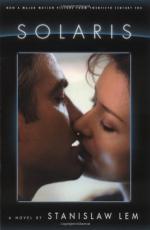|
This section contains 12,887 words (approx. 43 pages at 300 words per page) |

|
SOURCE: “Stanislaw Lem's Fantastic Ocean: Toward a Semantic Interpretation of Solaris,” in Science-Fiction Studies, Vol. 19, Pt. 2, July, 1992, pp. 192–218.
In the following essay, Geier examines Lem's fictional ocean in Solaris as a model for understanding how imaginary conceptions and phenomena are given linguistic reality in science fiction writing.
It is a commonplace that human consciousness can refer to things it does not perceive directly. Merely imagined or conceived objects can exist at varying degrees of distance from immediately perceived reality. Concepts can refer to things which were once capable of being experienced as present and are now absent (“Monica no longer lives here, she lives in Hamburg”); or to a reality which exists elsewhere and the existence of which I do not doubt, although I have never experienced it as a fact with my own senses, having knowledge of it only through reports or the daily news (“Two Israeli...
|
This section contains 12,887 words (approx. 43 pages at 300 words per page) |

|


